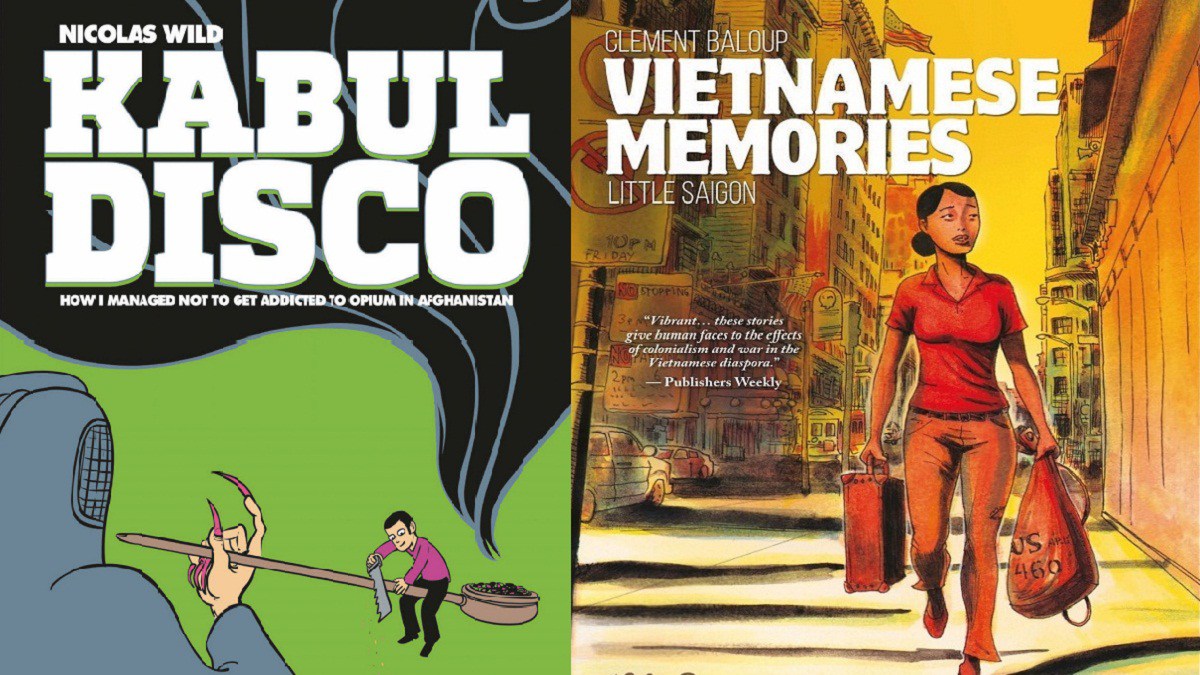 The second volumes of these two war novels are as rich and exciting as the first issues.
The second volumes of these two war novels are as rich and exciting as the first issues.
The first closes the story of Nicolas Wild in 2006 Afghanistan; the second continues to dig deep in the memories of Vietnamese refugees, this time in America.
Kabul Disco #2: How I Managed Not to Get Addicted to Opium in Afghanistan really sums up the experiences of Nicolas Wild in this country in 2006.
Nicolas has been in Afghanistan for a year now, and he returns to his headquarters with a new task: he has to design images that will help against the opium trade in Kabul and whereabouts.

To my taste his sense of humor is still shaky, but this time he is more used to Afghanistan and notices more subtle things. He is still obsessed with the French restaurant La joi de vivre and his friends and partners, but I would take it as a normal thing: usually it is very hard to get to meet people outside the office, especially if said office is in a former war zone: there are many security issues.
He does a good job explaining the opium trade, and the messy political system. He is more up to date. What’s more interesting, he now worries about his friends, and is able to make you feel the anxiety and the caged feel of the ambiance there. The highlight is in the last third of the book, when the entire team has to escape: riots really get out of hand in the city, it is a real emergency, and not surprisingly, their Afghan neighbors lend a truly helping hand and manage to bring everybody to safety.
All in all, some powerful images about the place get stuck into your mind, even if Nicolas jokes are not that funny. Kabul Disco Vol. 2 has been on sale since September 25th, 2018.
Publisher: Humanoids
Publication date: September 25, 2018
ISBN: 9781594654695
Price: $19.95
Vietnamese Memories #2 – Little Saigon by Clément Baloup made my day completely.
The personal stories of Vietnamese refugees and their arrival in America maintain the same dream-like quality of their French counterparts. By telling you just a handful of stories; he manages to sum up thousands of life experiences in a way that is both loving and deeply understanding. He also draws superbly and the scenes of his stories will be hard to forget.
Vietnamese refugees in America have something in common with the European stories, but what really caught my attention is the pervasiveness of gun violence and gangs in poor neighborhoods. Refugees here jumped from one type of violence to another: one where gun ownership is seen as a tremendous right, especially in the South.
And there is the thing about the little Chinatowns everywhere in the major cities: ghettos that have evolved into something unique, ready to sell nostalgia for all its worth. In them, Vietnamese food is the one thing everyone agrees upon: for all ex-refugees it is still the best food in the world.
Perhaps because women are more willing to talk, we get to see more female stories here, of how they survived, how they were imprisoned, how neglected they were, even when facing hardship with babies in their bellies. I think the story of a happy married woman who faced both depression and the suicide of her American husband is the one that resonated with me the most: I sympathized with her need to “get away,” and the strength she found afterwards; her sheer will to survive. I’m glad everything worked out for her in the end.
The Japanese refugee camps are also addressed, even though they’re not the main theme here, because they are a dark part of American history. They did not only round-up every Japanese citizen and kept them there until the end of the Second World War, they did the same thing with Latin American Japanese who were taken prisoners and sent to North America. Since I’ve been researching Japanese immigration in Bolivia, I know for a fact that a certain number of prisoners had to be delivered, and that the Bolivian authorities decided to fill in the gap with whatever Japanese citizen they could lay their hands on. It was a time of hardship for all Japanese immigrants in America.
As I said in my first review, this type of graphic novel teaches us a lot about ourselves. No matter who we are, a war has influenced our heritage. War is the ultimate game changer: it forces you to abandon old ways, it makes you change your mind, and sometimes it also forces you out of your country, facing you with the kindness or unkindness of strangers, dealing you a hand of hardship, perils and a vast unknown future.
We have to remember this, and try to lend a helping hand whenever we can. We might be refugees next, as Jorge Drexler says: history is like a revolving door.
Vietnamese Memories Vol. 2 has been on sale since November 2, 2018.
Publisher: Humanoids
Publication date: November 2, 2018
ISBN: 9781594657993
Price: $24.95












